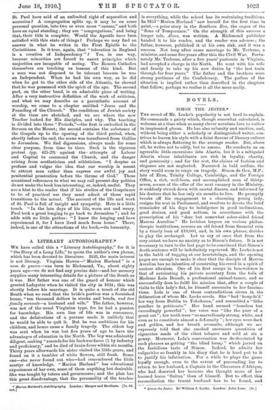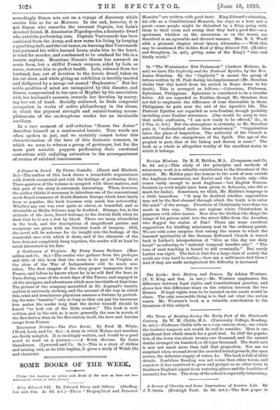NOVELS.
SIMON THE JESTER.*
THE secret of Mr. Locke's popularity is not bard to explain. He commands a gaiety which, though somewhat calculated, is welcome at a time when so many clever novelists love to wallow in inspissated gloom. He has also urbanity and unction, and, without being either a scholarly or distinguished writer, con- trives to leaven his style with a faint flavour of literary culture which is always flattering to the average reader. But, above all, he writes not to edify, but to amuse. He conducts us on agreeable little excursions into Alsatia, but it is a mitigated Alsatia whose inhabitants are rich in loyalty, charity, and generosity ; and for the rest, the claims of fashion and elegance are not neglected. Narrated in bald outline, the story would seem to verge on tragedy. Simon de Gex, M.P., late of Eton, Trinity College, Cambridge, and the Foreign Office, a rich, well-born, and accomplished man of thirty- seven, secure of the offer of the next vacancy in the Ministry, is suddenly struck down with mortal disease, and informed by his doctors that he has only six months to live. He promptly breaks off his engagement to a charming young lady, resigns his seat in Parliament, and resolves to devote the brief remainder of his days to indulgence in good inclinations, good desires, and good actions, in accordance with the prescription of his " dear but somewhat sober-sided friend Marcus Aurelius." He lavishes largess on various philan- thropic institutions, rescues an old friend from financial ruin by a timely loan of £10,000, and, in his own phrase, decides to play the archangel. Let us say at once that from the very outset we have no anxiety as to Simon's future. It is not necessary to turn to the last page to be convinced that Simon's death-sentence will be indefinitely reprieved. Mr. Locke is not in the habit of tugging at our heartstrings, and the opening pages are enough to make it clear that the disciple of Marcus Aurelius has no intention of construing his creed in a spirit of austere altruism. One of his first essays in benevolence is that of extricating his private secretary from the toils of Madame Lola Brandt, a professional animal-tamer, and so successfully does he fulfil his mission that, after a couple of visits to this lady's flat, he himself succumbs to her faseina, tions. Lola is one of those contradictions sirens in the delineation of whom Mr. Locke revels. She " had houp-la'd ' her way from Dublin to Yokohama," and resembled a "lithe panther in petticoats." Her hand seemed " boneless but exceedingly powerful " ; her voice was "like the purr of a great cat"; her teeth were " so marvellously strong, white, and even as to constitute almost a deformity "; her eyes were dark and golden, and her breath aromatic, although we are expressly told that she smoked enormous quantities of cigarettes made of the vilest tobacco and sold at six a penny. Moreover, Lola's conversation was de-decorated by such phrases as getting "the blind hump " which jarred on the fastidious taste of Simon. Indeed, he admits her vulgarities so frankly in his diary that he is hard put to it to justify his infatuation. For a. while he plays the game loyally enough, even to the extent of persuading her to return to her husband, a Captain in the Masseurs d'Afrique, who had deserted her because she thought more of her learned horse Sultan' than of himself. But to effect this reconciliation the truant husband has to be found, and
•
• Simon tho .Tester. Br William J. Locke. London: John Lane. [60.] accordingly Simon sets out on a voyage of discovery which carries him as far as Morocco. In the end, however, it is not Simon who unearths the recreant Captain, but Lola's devoted friend, M. Anastasius Papadopoulos, a fantastic dwarf who exhibits performing cats. Captain Vauvenarde has been cashiered from the Army, and now earns his living by keeping a gambling-hell; and the cat-tamer, on learning that Vauvenarde had poisoned his wife's learned horse, stabs him to the heart, is tried for murder, and condemned to be confined for life in a lunatic asylum. Meantime Simon's illness has assumed an acute form, but a skilful French surgeon, aided by Lola as nurse, restores him to perfect health. Lola, released from her husband, has, out of devotion to the heroic dwarf, taken on his cat show, and while giving an exhibition is terribly mauled and disfigured by a savage cat named 'Hephaestus.' But her noble qualities of mind are unimpaired by this disaster, and Simon, compromised in the eyes of Mayfair by his association with her husband's assassin, rewards her-devotion by marry- ing her out of hand. Socially outlawed, he finds congenial occupation in -works of active philanthropy in the slums, in which the physical strength and animal-taming accom- plishments- of the ex-dompteuse render her an invaluable auxiliary.
In a rare moment of self-criticism "Simon the Jester" describes himself as a sentimental lunatic. True words are often spoken in jest, and we certainly cannot better this characterisation of the hero of this fantastic romance, in which we seem to witness a group of grotesque, but for the most part amiable puppets performing their emotional contortions with unfailing animation to the accompaniment of strains of subdued lusciousness.











































 Previous page
Previous page